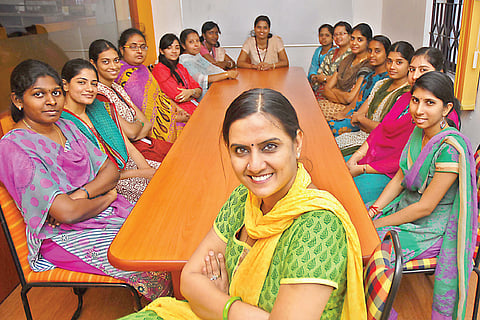

I believe that unless it is personal you don’t do anything about it, says Dr Saundarya Rajesh, founder-president and AVTAR Career Creations and Flexi Careers India. Dr Saundarya identified herself with the women who aren’t able to pursue a steady career due to a lack of a flexible working culture. “You take a break out of choice to raise kids and that makes you happy. But, your professional side is always unhappy,” says Dr Saundarya who is an MBA from the Central University Pondicherry and a gold medalist in English Literature from the Madras University.
AVTAR Career Creators that focuses on talent strategy consulting, restructuring, recruitment etc was set up in 2000. “Later in 2005, I got selected by the US government for International Visitor Leadership Program (IVLP) and Chevening Scholarship Programme by the UK,” she says. Both experiences taught her how exposing women to different situations can result in great benefits. The same year Interim Women-managers’ Interface Network (I-WIN) was born. I-WIN provides part-time, flexi-time career options with corporates for women.
Today more than a dozen organisations have embraced the concept of second career for women, giving them a chance to resume it. Dr Saundarya says, “It is a major victory for us because through workshops and conferences we have succeeded in taking it into their psyche.”
However, she says that the parity has to be achieved at several levels, more importantly as a social change. “We have sensitised men and made them realise the little ways they can make the difference. They have to be equal partners at home for women to be equal partners at work,” she says.
After close to nine years of work in increasing women’s participation in workforce, there has been a sea change, especially in the knowledge economy industry. “The knowledge economy industry (IT, ITEs, KPO, BPOs, advertising, media and market research companies) was the first to adopt it by choice and design. Corollary to that are manufacturing and old-economy industries who don’t want to have women in their workplace,” she says.
Dr Saundarya says that unless women are deeply passionate about their career, the change cannot happen.
“While there are challenges from the organisation as regarding the mindset and the efforts required to make a women conducive environment, there are some from the women’s end. They have a lot of self-doubt and don’t stay updated,” she adds.
Acknowledging that women always have a tenuous relationship with money, she also says that there is cost-arbitrage, as many believe that second career means they can be paid lesser than the market standards.
She says it is a long way to go, with 26.5 per cent women in the total work force. “The bad news is that economic participation and workforce participation have reduced. It is in contrast to the aspiration, as Indian women are most ambitious. Innately the fact that they have to be economically independent hasn’t been driven in,” she says. As part of its constant advocacy for change, just recently an event ‘Of Men, By Men, For Women’ was conducted by FLEXI Careers India in partnership with School of Management, SRM University. It was a unique concept with just men celebrating International’s Women’s Day with a difference. “Women’s Day events are inherently incomplete, since women do not exist in a vacuum and are hugely impacted by the men in their lives,” she says.